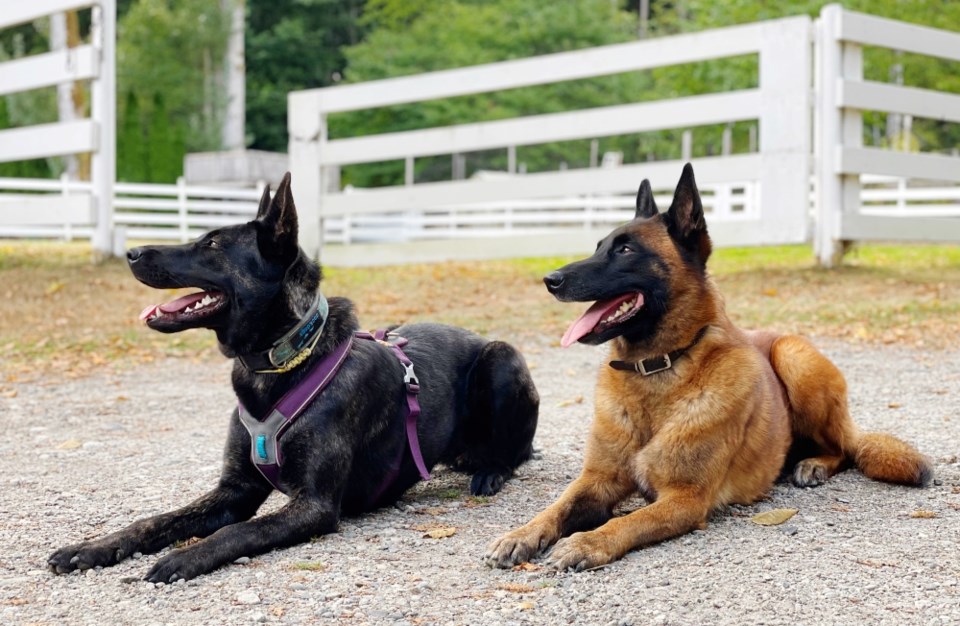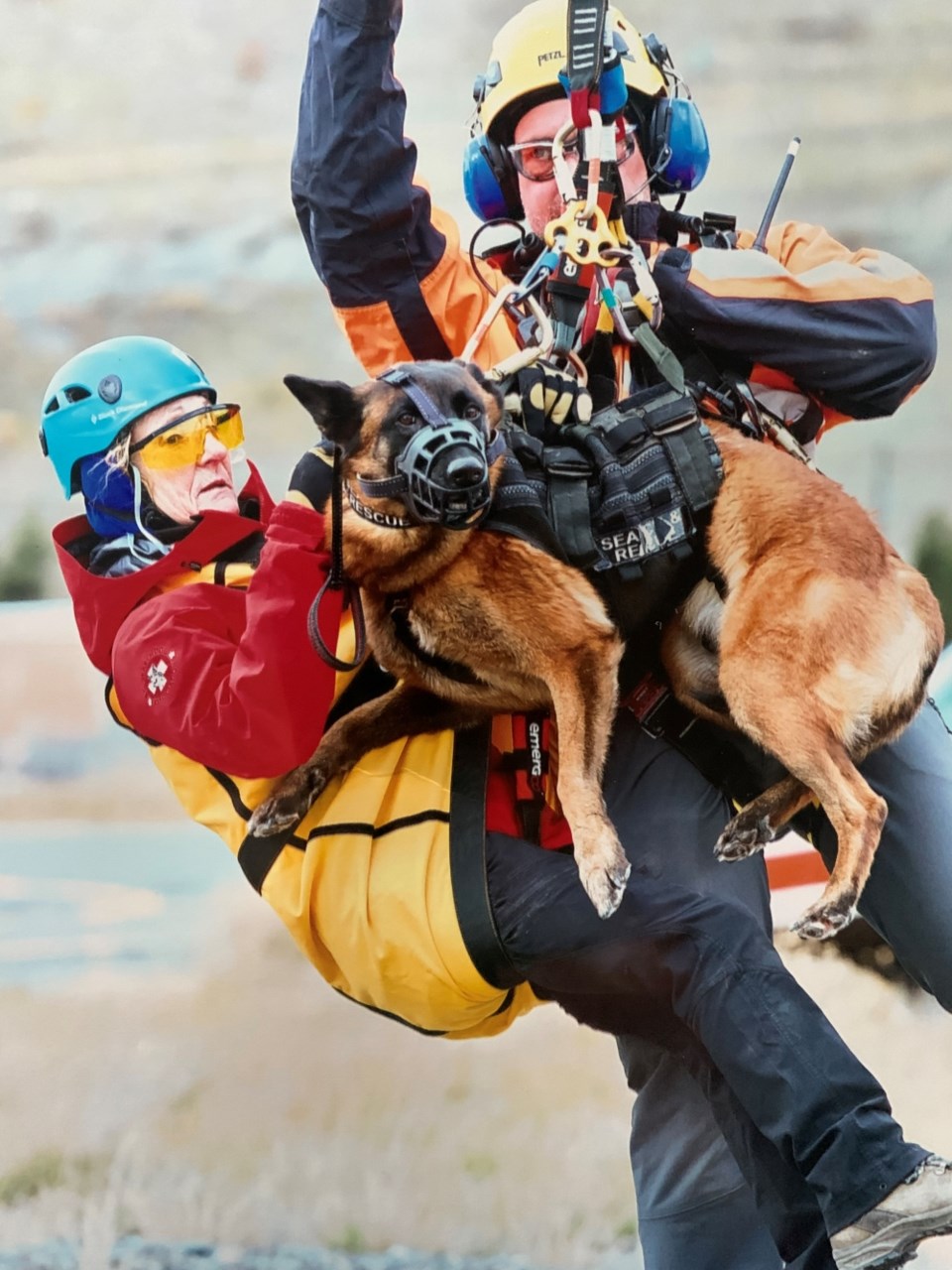A chill hangs in the damp air. Parts of the ground at a field in ts’ukw’um are frozen, but grass is still visible in some areas. Here is where Echo starts her search.
With her nose to the ground, the Malinois is fast. She pulls her handler and trainer Joyce Tattersall behind her as she races toward a hidden article of clothing.
Tattersall and Echo are both volunteers with the Sunshine Coast Search and Rescue ground team. Their expertise is most often used to search for missing people on the Coast, and the dog-handler team is also called to assist searches in other areas of the province.
When Tattersall gets the call for a missing person on the Coast, she automatically gets Echo ready. She estimates they attend 90 per cent of the local ground SAR calls.
Only certified dog on the Coast
At the No Pawblems kennel in Langdale, Tattersall showed Coast Reporter a behind-the-scenes look at training a canine for search and rescue. Echo is one of the 20 validated dog teams in the province, and currently the only certified dog on the Sunshine Coast, including the qathet region, Tattersall said. Their presence is important, as one dog can take the place of up to 15 ground searchers and they can handle harsher terrain faster. Despite common misconceptions, dogs won’t lose a scent if someone passes through water — Echo, Tattersall points out, can retrieve clothing from in a creek.
When they first met, Echo was coming from a situation that didn’t work out. She was only 11 weeks old, but had an injury on her leg. Once she healed, Echo and Tattersall began training right away. At the time, Tattersall was on the cusp of completing her own training as a “ground pounder,” a search and rescue volunteer. She wanted to train a search and rescue dog, which undergo their puppy assessment between six months and two years old, and knew she’d need a dog with high drive, the ability to focus and follow commands. A successful candidate will also like to play tug, because it ensures they won’t leave an item, such as a piece of clothing, behind during a mission.
In September, Echo and Tattersall received their seventh annual validation from police handlers.
“A dog can, in a lot of situations, pick up scent and go a lot quicker than we can. And some of [the terrain] pretty gruelling,” Tattersall said. “A lot of times we get put in areas where we think no person would ever be here. You'd be surprised where people end up crawling to.”
Old dog, new tricks
Recently, the RCMP started requiring dogs to track as well as air scent. This has been controversial in the search dog community, Sunshine Coast SAR manager Alec Tebbutt told Coast Reporter, because it requires much more training and time.
Air scenting is more suited to SAR’s mission to find someone quickly, rather than tracing their exact path. Tracking also requires the dog to remain on lead, “so the dog can only go where the handler can also go,” Tebbutt said.
When the change came into effect, Echo had spent nearly seven years volunteering without being on a tracking line. The first time Tattersall put Echo on the lead, the dog immediately tucked her tail in disapproval.

Zulu prepares to join the team
So Tattersall began training another dog to join Sunshine Coast SAR’s ranks. Zulu was successful in receiving her puppy qualifications at the BC Search Dog Association’s evaluations in Merritt this fall and is “looking really good.” Now two years old, the pup came highly recommended to Tattersall. (One of Zulu’s brothers works as an avalanche and wilderness rescue dog in Revelstoke.)
Zulu was intended to be Echo’s replacement. But the more senior dog, eight and a half years old, is still working at the rate of a dog half her age, Tattersall said. And, it turns out you can teach an old dog new tricks: Echo is now more receptive to tracking.
Zulu may not take over from Echo as quickly as anticipated, but that could be a benefit to the team as having two trained dogs means one can be on standby for the other and swap in when the first dog needs to rest. Tattersall is the only one qualified to handle either dog — they are a package deal.
Demanding volunteer career
With the change in dog training requirements, Tebbutt says that he thinks Tattersall and Echo will be called on to assist more searches around the province. They’ve accepted tasks in Pemberton, on the North Shore, Vancouver Island, Salt Spring Island and more areas in the region, going wherever they get called for help. While it’s a volunteer effort, Tattersall’s travel expenses will be covered.
Search and rescue can be demanding. During the interview with Coast Reporter, Tattersall’s phone begins to ring — it’s a callout to search for a missing person. Quickly, she goes to grab her emergency bag and get Echo prepared. Her husband is ready to step in to run the kennel so Tattersall and Genevieve Pierre (another SAR volunteer who works at the kennel) can attend calls.

A lifelong passion
When Tattersall first began working with dogs at 15 years old, she claimed to be 16 in order to work at the pet hospital. She became certified as an animal health tech, which she did for 20 years before moving to the Coast and opening her own kennel and training business. She was also involved in first aid through St. John’s Ambulance and decided to combine her passions.
“I always like helping people, so the combination of helping people, working with dogs and being outside? Perfect fit,” says Tattersall.
The K9 unit is considered a tool in the search and rescue world, but Echo is much more to Tattersall. Over the years, the two have formed a close bond. Tattersall can read the dog’s body language, pass along crucial information and lead one another in the right direction.
As the training session is wrapping up, the phone rings again. Tattersall and Echo are being called out for exactly what they’re training to do: find someone who needs help.


